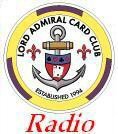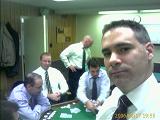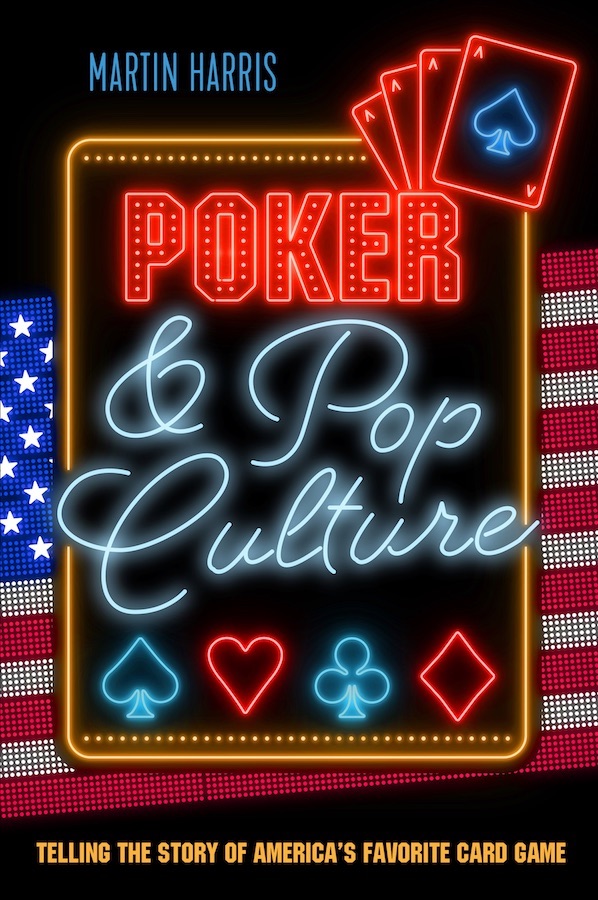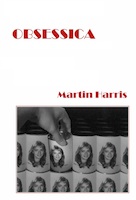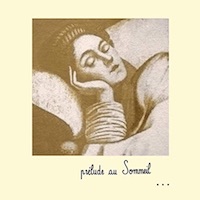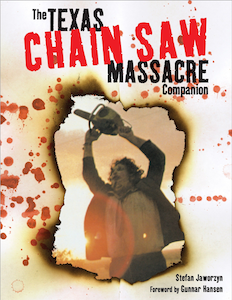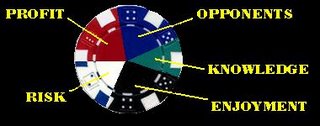
Still thinking about the many ways poker can be meaningful. Those five motives listed in
the previous post (discussed by the
Ante Up! guys) aren’t everything, of course. Poker can be other things as well. A creative outlet. An escape. A chance to socialize. An occasion for an amateur existentialist to explore his beliefs. You name it.
Even so, the more I think about those motives, the more I’m led to believe they might be refashioned as “principal categories” defining what poker means to (nearly) everyone who plays. In other words, poker means the following to all of us: (1)
profit; (2)
opponents; (3)
knowledge; (4)
enjoyment; and (5)
risk. I don’t think I would be going very far out on a limb if I were to claim that anyone who plays poker does so because he or she wishes somehow to introduce these five things into his or her life -- to different degrees, of course.
As I mentioned before, these categories overlap considerably. It’s probably futile to try to talk separately about, say, wanting to make a profit and wanting to enjoy oneself. Indeed, it is a poker cliché to say I play to have fun but the more money I win the more fun I have. Still, we can distinguish between these motives somewhat, and part of assessing one’s own game is understanding which of these means more or less to oneself.
I thought I’d try to describe my own preferences here (or what I believe those preferences to be at this moment, anyway). To avoid becoming overly abstract, though, let me do so by discussing a particular hand I played from early last week. Rather than analyzing my play (directly), I’ll be analyzing what the hand “meant” to me given how I regard the significance of those five motives listed above. It’s a good thing, actually, that I’m not specifically analyzing my play in this hand, because it wasn’t so hot. In fact, it stunk. I’m about to share with you a (thankfully) rare instance of my having done what
Miller/Sklansky/Malmuth repeatedly describe as a “disastrous” play in limit hold ’em -- I folded the best hand!
Here’s how the hand went down. It’s a 6-max, $0.50/$1.00 game. I’d been at the table for almost three orbits -- 16 hands, to be exact -- and so had just begun to pick up on some of my opponents’ tendencies. (I’d never played with any of these players previously.) The table was quite aggressive. For a hand to be checked around on any street had been a rarity. In those 16 hands I’d managed already to drop a little over $10, mainly thanks to having lost two fairly big hands. In the first, my
JJ lost to
AK when my opponent turned a king. In the other, I had limped into a family pot from late position with
KT-offsuit, then called the big blind’s preflop raise (along with four other players). The board ended up
T6249 (no flush) and I lost to the preraiser’s pocket queens.
In this particular hand I was in the BB and was dealt
JJ once again. Before the flop, UTG limped, UTG+1 raised, I reraised, and both players called. So there’s $4.75 in the pot and I’m out of position against two opponents. And a little bit out of sorts, given the poor start to the session.
The flop came



-- a decent flop for me, one would think. I bet and both of my opponents called. $6.25 in the pot. The turn was the

and I actually checked. To be perfectly honest, my memory is a little foggy here as to why I checked. In fact, when I looked back at the hand in
Poker Tracker I was surprised to see that I had. What the hell was I thinking?
I might have had an idea that one of my opponents would take a shot at stealing this pot (as I said, I’d seen very few examples of a round with no one betting out) and I would check-raise him. More likely, though, I had grown timid -- perhaps affected somewhat by having recently lost with jacks -- and didn’t like being out of position with this holding. Whatever my reasons were, both opponents seemed invigorated by my show of weakness, with UTG quickly betting and UTG+1 then raising to $2. I was sure one had at least paired his queen, and so I let it go. (Looking back, I can see how I might well have been looking for any excuse to let this one go.) The river brought the

, making the board
55Q3Q. I was slightly surprised to see both players check. UTG had


. UTG+1 had


, winning the $10.25 pot (minus $0.45 for the rake) with his ace kicker to the two pair on the board.
Not too much worse, really, than taking a few hits in hands you play correctly (or mostly correctly), then losing a nice-sized pot after a misstep like this one. The check on the turn -- frankly an uncharacteristic move on my part -- killed me here. And the decision by the eventual winner of the hand to reraise was well-timed, since he succeeded in making the best hand fold.
So this was a hand I clearly botched, losing not only what I’d put in the pot but what others put in as well. What did the hand “mean” to me, though? Let’s see . . . .
 rofit.
rofit. I play poker for real money and keep careful records of my wins and losses. I am overall a winning player, and that is important to me as I continue forward. The fact that after this hand I had $2.00 less than I had before it started -- when I might well have added $7.80 or even more to my stack if I’d stayed in the hand -- obviously means something to me. I wouldn’t go so far as to say that the amount I earn in a given hand eclipses all other “meaning” for me, but it does tend to affect everything to some degree (for me). At times I think this is another potential flaw in my game, the fact that I care too much about what the chips actually represent. Indeed, fretting over losses in previous hands likely didn’t help my decision-making in this one.
 pponents.
pponents. I do derive a great deal of motivation from facing competition. Some time back I attended a large midwestern university. For those who liked to play basketball, at this school they could easily find several pick-up games running in the centrally-located gymnasium -- pretty much 24/7. I played in the games regularly (three times a week). Shooting around is okay, I guess, but I always preferred the games. I liked having a place where I could count on finding opponents against whom I could compete. Poker similarly satisfies such a desire. While I’m generally not interested in seeking out conflicts in other areas of life, I do so when playing poker. I appreciate skillful play. In fact, I’d call it another weakness of mine not to walk away from a table when I find myself up against one or more obviously talented players. Rather, I want to stay and see if I can compete. In this hand, I like how both of my opponents played the turn -- both had flush draws, and both pounced after I showed weakness. Hopefully I learned something from how they handled this hand. I do hate losing the hand, though. Here I competed poorly and thus (as often, but not always, happens) ended the hand one of the losers. And that, too, is meaningful to me.
 nowledge.
nowledge. I do think I learned a bit from this hand and so it did satisfy my intellectual curiosity perhaps more than the average hand does. I learned something about these two players, obviously, as well as the situation I was in (one that will undoubtedly recur in the future). I also learned something about myself. I recognize a couple of patterns exemplified by the hand that may be of use to me in the future. I see how winning or losing previous hands can affect my decision-making moving forward. I also see how difficult it is to manage two opponents from out of position, particularly if both show aggression. (Additionally -- perhaps most importantly -- I also see in this hand evidence that I’m probably still not ready to move up a level.) Since building my knowledge base is a considerable motive for me, I see this hand as contributing significantly to that endeavor.
 njoyment.
njoyment. Having fun playing poker is also important to me. And while I don’t necessarily equate having fun with winning money, I do tend to derive less pleasure from losing sessions. I probably have the most fun when I feel as though I’m playing well -- making good reads, value betting when appropriate, etc. So it is possible for me to lose money and still enjoy myself, although I doubt I could have fun for very long that way. The hand was hardly pleasurable for me, but I am getting a certain amount of gratification from looking back on it here. And so while adding to my knowledge base does provide me with a kind of pleasure, ultimately this hand mostly “means” pain for me.
 isk.
isk. Perhaps as a consequence of the particular importance I place on my profit, I do not receive any special satisfaction from taking risks. Especially foolhardy ones. My play in this hand certainly illustrates that tendency. As does my decision to stick primarily to limit games rather than venture over into the deep end of the pool and swim with the no limit sharks. I must like to gamble some, because however much we want to claim poker is a skill game, it is also gambling. And I’m certainly getting something from that. In this hand I toyed with risk a bit, then thought it too great to continue.
Like I said, I ain’t so proud of this here hand. But it does illustrate some of the things that poker “means” to me. What might be the optimal balance between these different motives -- or attempts at “meaning-making” -- that would produce the most successful poker player? Who knows? I suppose, in the end, the answer depends on what one means by “successful.”
Labels: *shots in the dark, existentialism, Poker Tracker
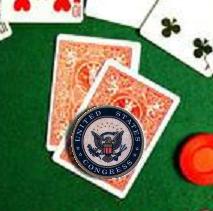 Had a marathon session last night over on Stars. At least by my standards. Was three-tabling it for quite a while, ultimately playing over 1,500 hands (of $0.50/$1.00 LH) before I finally hit the hay. Kind of unusual for me, as I usually prefer only to play a couple hundred hands (or less) during a given session. (Usually do better playing shorter sessions as well.) Did okay, though, ending about $27 to the good. And, as an unexpected surprise, I cleared my WCOOP reload bonus as well (for $100 more), so it was a lucrative evening.
Had a marathon session last night over on Stars. At least by my standards. Was three-tabling it for quite a while, ultimately playing over 1,500 hands (of $0.50/$1.00 LH) before I finally hit the hay. Kind of unusual for me, as I usually prefer only to play a couple hundred hands (or less) during a given session. (Usually do better playing shorter sessions as well.) Did okay, though, ending about $27 to the good. And, as an unexpected surprise, I cleared my WCOOP reload bonus as well (for $100 more), so it was a lucrative evening.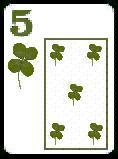

 . Presto! I decided to reraise. I figured if I got loose calls, I’d cash in should the set arrive, and if I didn’t I’d have isolated Powell at least. The cutoff, MyrnaLoy, did indeed call the three bets, then it folded back to Powell who capped it. Didn’t feel like Powell had just two overs anymore, but I did make the call, of course, to see that flop. MyrnaLoy also called and we were three-handed with a pot of $6.75.
. Presto! I decided to reraise. I figured if I got loose calls, I’d cash in should the set arrive, and if I didn’t I’d have isolated Powell at least. The cutoff, MyrnaLoy, did indeed call the three bets, then it folded back to Powell who capped it. Didn’t feel like Powell had just two overs anymore, but I did make the call, of course, to see that flop. MyrnaLoy also called and we were three-handed with a pot of $6.75.

 and Powell bet out as expected. Hoping to confirm once and for all what my opponents were holding, I went ahead and raised it. Both called. What did I conclude? Figured Powell might hold a middle pair and didn’t care for that board much (esp. being out of position as he was). He could have flopped a set himself and was being cute, but that seemed unlikely. MyrnaLoy, meanwhile, likely had hit a jack or ten, or might be drawing. In any event, I was just about dead certain I wouldn’t be running my wired fives through this here board.
and Powell bet out as expected. Hoping to confirm once and for all what my opponents were holding, I went ahead and raised it. Both called. What did I conclude? Figured Powell might hold a middle pair and didn’t care for that board much (esp. being out of position as he was). He could have flopped a set himself and was being cute, but that seemed unlikely. MyrnaLoy, meanwhile, likely had hit a jack or ten, or might be drawing. In any event, I was just about dead certain I wouldn’t be running my wired fives through this here board.  and UTG checked. If I had been at all unsure before, I was now thoroughly finished with the hand and checked behind. Myrna Loy also checked (perhaps fearing that king, I thought). The river was one of those seductive “dangerous dame”-types shamuses know often look too good to be true -- the
and UTG checked. If I had been at all unsure before, I was now thoroughly finished with the hand and checked behind. Myrna Loy also checked (perhaps fearing that king, I thought). The river was one of those seductive “dangerous dame”-types shamuses know often look too good to be true -- the  , giving me my set but also potentially making someone a flush.
, giving me my set but also potentially making someone a flush.
 and MyrnaLoy’s
and MyrnaLoy’s 
 .
.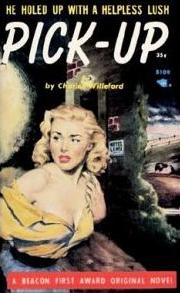


 and I actually checked. To be perfectly honest, my memory is a little foggy here as to why I checked. In fact, when I looked back at the hand in
and I actually checked. To be perfectly honest, my memory is a little foggy here as to why I checked. In fact, when I looked back at the hand in  , making the board
, making the board 
 . UTG+1 had
. UTG+1 had 
 , winning the $10.25 pot (minus $0.45 for the rake) with his ace kicker to the two pair on the board.
, winning the $10.25 pot (minus $0.45 for the rake) with his ace kicker to the two pair on the board.




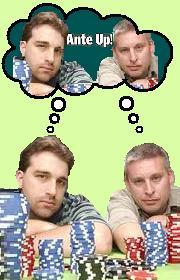

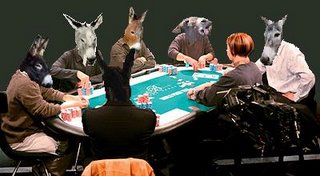


 . It checked around to HerkyJerky who bet, I raised, he reraised, and I capped. Clearly we were going to the river with this one. The turn was the
. It checked around to HerkyJerky who bet, I raised, he reraised, and I capped. Clearly we were going to the river with this one. The turn was the  and HerkyJerky soon had all his chips in the middle. The river brought another jack, and HerkyJerky showed his queen for top pair. I was up to 4,380 in chips, above the average stack. Meanwhile, HerkyJerky surprisingly chose not to rebuy and left the tourney having finished in 178th.
and HerkyJerky soon had all his chips in the middle. The river brought another jack, and HerkyJerky showed his queen for top pair. I was up to 4,380 in chips, above the average stack. Meanwhile, HerkyJerky surprisingly chose not to rebuy and left the tourney having finished in 178th.

 , then the last bit of ’em on the turn (a king). Alas, he has kings in the hole -- crushing me with a boat -- and I’m down to 1,770. Next hand I play I flop top pair and lose the rest to Mr. 20,000’s set. And that was that. Ten hands total at my new table, and I was done.
, then the last bit of ’em on the turn (a king). Alas, he has kings in the hole -- crushing me with a boat -- and I’m down to 1,770. Next hand I play I flop top pair and lose the rest to Mr. 20,000’s set. And that was that. Ten hands total at my new table, and I was done.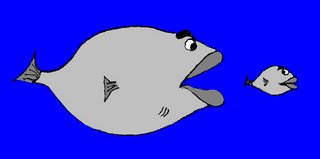


 and HowDareYou led out with a bet. I assumed by his bet that he'd caught some part of that flop. Influenced equally by my overcards, draws, and position -- and, perhaps, simple-minded inertia -- I decided just to call. (Narrating this now, after the fact, I see that a raise from me was certainly in order here. See why?) The pot was a modest $2.25. The turn then came the
and HowDareYou led out with a bet. I assumed by his bet that he'd caught some part of that flop. Influenced equally by my overcards, draws, and position -- and, perhaps, simple-minded inertia -- I decided just to call. (Narrating this now, after the fact, I see that a raise from me was certainly in order here. See why?) The pot was a modest $2.25. The turn then came the 
 . Not to say I played the hand particularly well -- indeed, the act of describing this hand shows me pretty clearly I wasn't at my best here -- but here's someone calling a late position river reraise with a pair of nines while staring at two overcards and a possible straight on the board.
. Not to say I played the hand particularly well -- indeed, the act of describing this hand shows me pretty clearly I wasn't at my best here -- but here's someone calling a late position river reraise with a pair of nines while staring at two overcards and a possible straight on the board. 